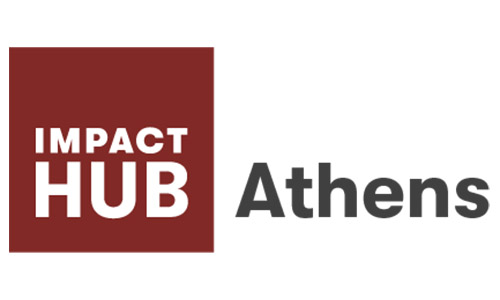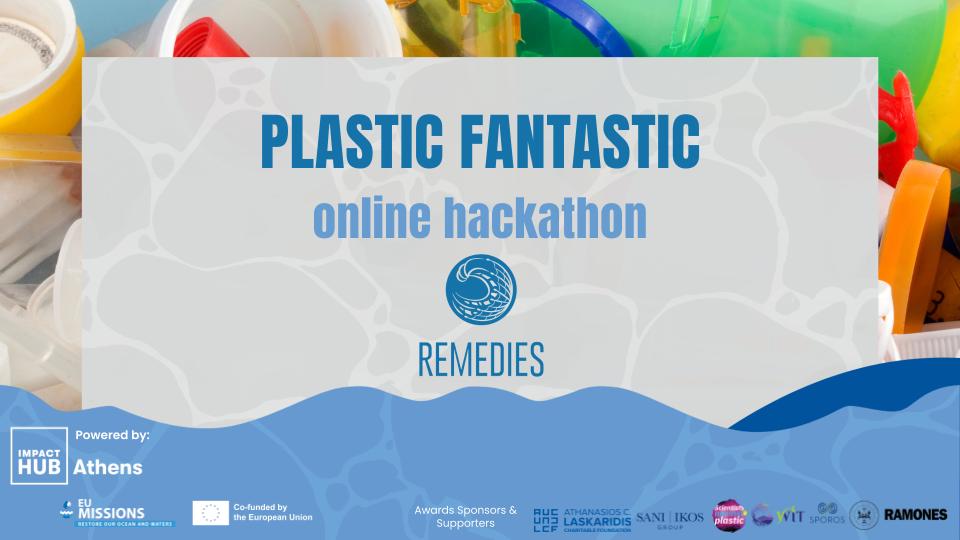The Plastic Fantastic Hackathon innovation competition took place successfully in Athens from April 10 to April 18, 2024.
Organized by Impact Hub Athens as part of the Remedies project – the first project implemented under the EU Mission: Restore Our Ocean and Waters, the Plastic Fantastic Hackathon aimed to create and support innovative solutions for addressing challenges related to plastic pollution in the oceans.
The hackathon began with 24 teams participating in a three-day boot camp. During the boot camp, teams had the opportunity to attend masterclasses on entrepreneurship and meet and converse with experts such as Bart Stegeman (Climate KIC), as well as successful researchers and entrepreneurs like T Theo Mertzimekis (RAMONES), Andy Bownds (EcoBrixs), and Soeren Lex (Plasticpreneur).
At the end of the first three days, the teams were evaluated by 20 experts in environmental entrepreneurship, and 15 of them earned tickets to the second phase of the hackathon. In this phase, they participated in educational workshops by WWF Greece on green financial tools and ΕU4Ocean on positive social impact, while receiving personalized advice from 35 experts focusing on plastic, innovation, and entrepreneurship.
The competition concluded with a presentation by Kestutis Sadauskas, Directorate-General for Maritime Affairs and Fisheries at the European Commission, who congratulated all the teams, discussed the EU Mission’s objectives, and shared future opportunities with the participating teams and organizations.
The process concluded with presentations by all teams to the jury consisting of Uroš Novak (Remedies), Sophie Lambrou (Impact Hub Athens), Dimitris Kokkinakis (Impact Hub Athens), Eleni Petra ((Athena Research Center), Aggeliki Kosmopoulou (Athanasios C. Laskaridis), Levin Pal (Slovenian Research and Innovation Center), Eleni Andreadi (Sani/Ikos), and Andrei Geica (Sporos Platform), which resulted in the selection of the 4 winners, presented below:
Captoplastic (Spain): Technology that monitors and records microplastics in water bodies, applicable in various facilities such as wastewater treatment plants, drinking water treatment, bottling, plastics, fabric dyes, recycling, etc.
BioFlocean (Turkey): Bioplastic from microalgae used for liquid waste treatment and carbon absorption. Their innovative solutions, based on advanced biological processing technologies, effectively remove pollutants from aquatic environments, protecting marine life and aquatic ecosystems.
BioRise (Greece): Conversion of plastic waste into high-value bio-products using advanced microbiological facilities. Their main goal is to develop new biotechnological tools, enzymes, and microorganisms for second-generation biofuel production, bio-based polymers, and chemical compounds within the framework of industrial bio-recycling.
Droplinet (Estonia): Precision technology for monitoring micro and nano-plastics in environmental water samples through micro-pollution technology based on micro-material receptors. The comparative advantage of this portable technology is that it detects low concentrations of micro and nano-plastics, automates processes, and requires minimal specialization, providing high-speed results acquisition.
The awards received by the winners were:
- Financial support of €8,000
- Technology products worth €2,000
- Acceleration Support for 3 months from Impact Hub Athens
Dimitris Kokkinakis, co-founder of Impact Hub Athens and member of the jury, stated, “With the conclusion of the 9th Annual OurOcean Conference held this week, it is the best time to think forward for actionable solutions. Plastic Fantastic is a temporary zone, a virtual space that serves our promise for positive impact, creating entrepreneurial communities, showcasing innovative ideas, promoting collaboration, researchers with entrepreneurs, policy makers with citizens, artists with scientists, mobilizing resources towards sustainability.”
Efstratios Nikolaivits from the winning team BioRise commented on the hackathon, “What we particularly enjoyed was the interaction with the experts as it offered us a different perspective, showing how a scientific idea can become a business. The experts provided us with ideas for professional presentation and understanding of the global market situation. As for the opportunity to participate in the Acceleration Phase, our main expectation is to evolve our idea into a scalable solution. Our goal is not only to develop a sustainable business model but also to shape strategic partnerships and expand our network within environmental and business circles. We aim to maximize our impact and contribute significantly to the global effort to reduce plastic pollution.”
We would like to thank our sponsors who, with their support and active participation, contributed to the success of the Plastic Fantastic Hackathon. Our goal is to continue to connect and strengthen the first entrepreneurial Plastic Fantastic community in the Mediterranean region!
Warm thanks to Sani/Ikos Group, the Athanasios C. Laskaridis Foundation, Sporos Platform, WIT & Scientists Against Plastic, and RAMONES.
More information about the hackathon and the Remedies program:
The issue of ocean pollution from microplastics has emerged as an urgent concern as we face the challenges posed by climate change, and the need for innovative solutions continues to grow. Microplastics, which are small particles often invisible to the naked eye, have infiltrated marine ecosystems, threatening marine life and human health. In response, microplastics management programs have emerged as critical initiatives for transitioning to a cleaner environment.
Microplastics management programs play a central role in reducing the negative impacts of pollution. One such program is Remedies, aiming to create innovative solutions and technologies for monitoring, collecting, preventing, and using (micro)plastics in the Mediterranean. Our approach is based on science, circularity, and community involvement, with the goal of protecting water ecosystems, reducing plastic pollution, and developing a climate-neutral economy.
Remedies is a 4-year Horizon Europe Innovation Action program where 23 partners from 12 countries join forces to develop 12 different innovative solutions for reducing microplastics in European waters. These innovations will be tested in 8 Mediterranean countries and replicated in 33 new locations, aiming for their dissemination throughout the entire Mediterranean.
Utilizing its extensive experience in circularity and community empowerment, Impact Hub Athens participates in REMEDIES by promoting awareness, encouraging behavior change, and engaging multidimensional communities in the fight against pollution. Specifically, in the Cyclades region, Impact Hub Athens monitors plastic pathways in the Aegean Sea, investigates the prevalence and collection of plastics on beaches, and strengthens supply chains for creating alternative solutions to reduce plastic waste.



